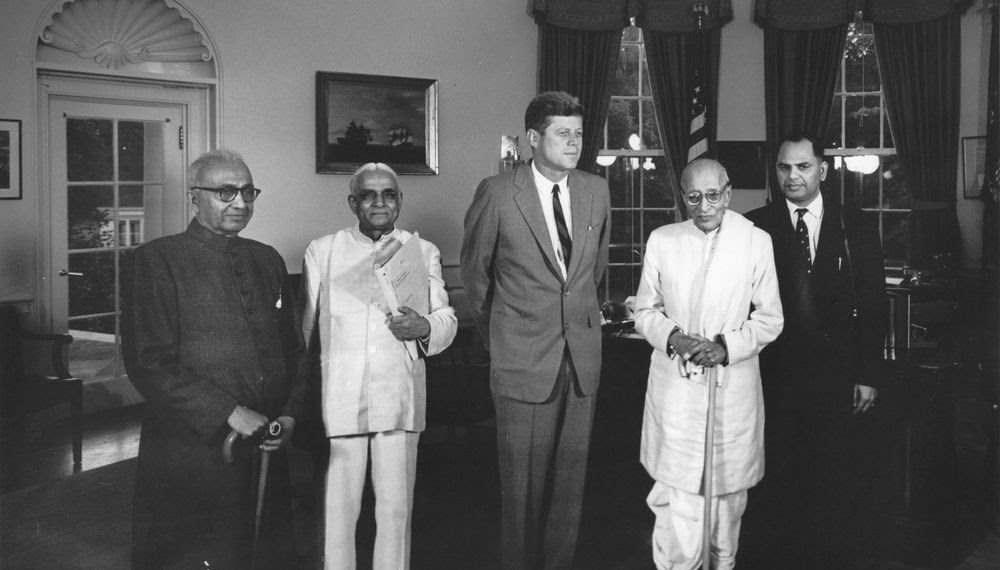Rajaji’s September 1962 meeting with US President Kennedy. Credit: Abbie Rowe. White House Photographs. John F. Kennedy Presidential Library and Museum, Boston.
As the onset of the Indian republic coincided with the postwar bipolar order of superpower rivalry, Indian politicians with an active interest in international politics intervened vigorously in the debates about global order, world government, great power politics, and the nuclear arms race. While the internationalist vision of Nehru and his advocacy of non-alignment is well-recognized and deservedly so, the same is not the case with his comrade-turned-opponent C Rajagopalachari, also known as Rajaji. In a bid to uncover the forgotten internationalist vision of Rajaji, this article would focus on his take on the nuclear arms race unfolding between the US and USSR in the initial phase of the Cold war.
The nuclear threat to stability and global order apparently haunted the conservative imagination of Rajaji. As a perusal of his columns in Swarajya would clearly demonstrate, he was deeply concerned about the possible radioactive fallout of nuclear testings and saw with derision the mad specter of nuclear brinkmanship between the two superpowers. A trusted lieutenant of Gandhi in days of anti-colonial struggle, he reinvented himself as an anti-nuclear weapons activist as the Cold war picked pace. His main concern lay with the dangerous radioactive fallout from nuclear testing and the threat to human survival from nuclear weapons. Commenting on the tendency of nuclear powers to evade the responsibility for radioactive danger to human health, he compared them to Big Tobacco which dubiously tried to mislead public opinion on the deleterious health implications of smoking. Writing in the May 30, 1959 issue of Swarajya, he also criticized ‘hired scientists’ making the case against the nuclear test ban for their misleading claims about health hazards. He argued that ‘the health of the world is the real issue but that issue is pushed out by issues of security and mistrust as between the cold war blocs.’ In the race to achieve nuclear hegemony, the Cold war superpowers were willing to ignore the danger of radioactive fallout from nuclear tests. This, for Rajaji, amounted to ‘a wholly illegitimate attack on the health of the present and future generations of the uninvolved millions, who have not yet written off their rights in favour of the nuclear pugilists.’ (Swarajya, 20 June 1959)
Rajaji’s criticism, though, was not merely limited to the advocates of nuclear weapons. His disagreement also extended to a section of anti-nuclear activists. As he wrote in the January 3, 1959 issue of Swarajya, in most countries, the campaign against nuclear tests was closely associated with the campaign for the world government. Proponents of both sought to first establish the world government and then use it to put an end to the nuclear menace. Untenable and impractical a proposal that the world government was, Rajaji saw it as a convenient escape route for activists from the more difficult task of the campaign for peaceful co-existence of nuclear powers.
In the initial phase of the Cold war, the nuclear arms race led to an innovative nuclear strategy of Mutually Assured Destruction for survival in both Washington and Moscow to deal with the Cold war adversary. However, the logic of the fragile balance of terror strategy of superpowers to pursue peace did not exactly sound convincing to Rajaji. For instance, he saw the Truman administration’s policy of brinkmanship as a contradiction in the sense that NATO wanted to avoid war at any cost and the West dreaded actual hostilities, yet believed in walking on the brink. In the exit of the abrasive Secretary of State John Foster Dulles, Rajaji saw the opportunity for a turning point in western policy away from brinkmanship. Earlier, he had criticized the Eisenhower doctrine which according to him nullified any hope for world disarmament in the near term.
In a surprising endorsement of the Indian policy of non-alignment despite a clear break with Nehru in 1959, Rajaji clearly resented ‘the recent effort of some Western statesman to frighten India about China.’ To him, it was an invitation to India to join the Cold war which warranted unhesitating rejection. In the same article, he went on to criticize the lack of co-operation from America in Indian efforts to ban nuclear weapons. In line with the dominating theme of Third Worldism, he gave a call to action to other nations to hold the US and USSR accountable for nuclear damage. The tendency of western powers to treat newly decolonized nations as the playground for the Great Power rivalry also did not find favor with him. Rajaji’s initial adherence to non-alignment and advocacy for Third World autonomy seems to suggest a greater degree of convergence with Nehruvian foreign policy vision than what is commonly believed. This is not to deny the sharp differences that existed between the two giants on the issue of China, Pakistan, Kashmir’s autonomy, and alignment with the US.
A veteran practitioner of the Gandhian civil disobedience mode of resistance to power, Rajaji favored morally courageous unilateral moratoriums as the way forward for the nuclear tests ban. In this regard, Nikita Khrushchev’s March 1958 unilateral announcement of the cessation of tests vindicated his belief that ‘there is greater moral power in right action, unilaterally undertaken.’ Interestingly, Rajaji had earlier written to Khrushchev asking the same which might explain his jubilatory tone at this move towards easing the nuclear tension. In service of the cause, he also undertook an arduous tour to meet president Kennedy in 1962. The meeting saw an eloquent Rajaji making case for a unilateral nuclear test moratorium and a charmed Kenndy listening patiently. B K Nehru, the then-ambassador to the US, later noted ‘… I had seldom seen a case presented with such lucidity of argument, such economy of speech, such felicity of language, such gentleness of manner and such commands of facts as Rajaji displayed that day. It was interesting to watch President Kennedy’s reactions, for he too was a great admirer of style. One could almost see his eyes open wider and wider in wonder and in admiration of the frail little man who was making this masterly presentation.’ The US tour was followed by a meeting with Pope John XIII seeking his blessing for the campaign against nuclear tests. Rajaji also asked for a Papal plea against the nuclear tests. The Pope delivered on the demand by issuing an encyclical containing a plea for stopping the nuclear test explosions.
In 1963, the Partial Test Ban Treaty followed the suit. In response to Rajaji’s congratulatory letter, Kennedy acknowledged the great statesman’s role: ‘Even so limited a beginning cannot help but carry forward the cause of peace for which you have so devoutly laboured.’ Rajaji’s intellectual activism for a world safe from the menace of nuclear weapons stemmed from the conservative concern for stable order and was guided by a belief in the efficacy of Gandhian civil resistance to power. Even at a frail age, his sane voice made a small impact on bipolar powers as recognized in his correspondence with Kennedy and Khrushchev.


